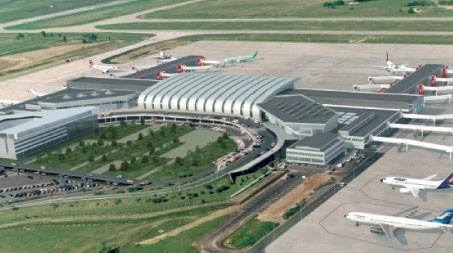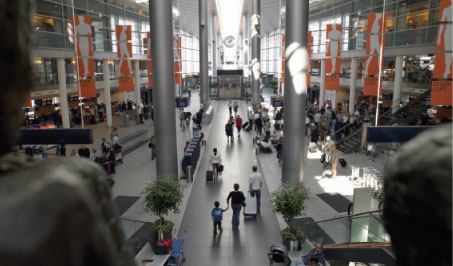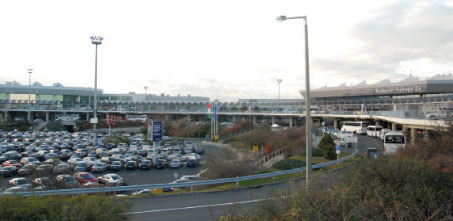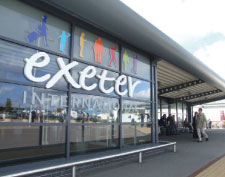Hochtief AirPort has been growing steadily for the past ten years, regardless of any relevant market developments and it intends to continue doing so, citing financing acquisitions on a long-term basis as an effective protective strategy. Chief executive Dr Reinhard Kalenda said: “There is no denying that this sector faces major challenges, which it will need to cope with and which, at least indirectly, will have an influence on the privatisation of airports. For the time being, however, the credit crunch is not having any effect on Hochtief AirPort. As airport investors and operators, we are geared to the long-term and so we have financed our acquisitions on a long-term basis – and that is why we are not affected by the present crisis. Another factor is that infrastructure facilities are once again demonstrating their value as stable investments. When the Budapest Airport loan was syndicated last autumn – in other words after the crisis had begun – the offer was even slightly over-subscribed. That shows just how positively airports are rated. In the medium-term, however, the new market conditions will exert pressure on the purchase conditions for upcoming acquisitions.”

Hochtief acquired 75% of the shares in Budapest Airport last year. Work is underway to link Budapest Terminal 2a and Terminal 2b with a contemporarily designed Skycourt.
Allan Moss, Macquarie Group’s recently retired group managing director and CEO, explained that Macquarie has weathered the economic climate, which can largely be attributed to the company’s established no risk management policy. “Macquarie remains very profitable, well capitalised and well funded. We have no unusual trading exposures and no unusual concerns with credit quality, reflecting our strong commitment to risk management. Despite market conditions, our global business platform has never been stronger,” he said.

Late last year, MAp increased its stake in Brussels Airport to 62.1%. Kerrie Mather, chief executive of Macquarie Airports (MAp), said: “While our focus is on our existing assets, we will assess all opportunities that arise, including the current privatisation opportunities against our strict investment criteria and consider opportunities that will add value for our investors.”
Balfour Beatty, the international engineering, construction, services and investment group, reported cash generated from operations up by 29% at £281 million (€355 million) in its preliminary results for the 2007, with its order book increased by 25% to £11.4 billion (€14.4 billion). Balfour Beatty raised money earlier this year through well-placed shares, widening its financial margins and allowing it more flexibility in the uncertain economic climate. The company, which recently completed a handful of acquisitions, raised £186 million (€235 million) by placing shares that increased its share capital by almost 10%. The placing of 43.3 million shares at 430p (540 Euro cents) supported the company’s growth following its acquisitions.

By 2015, the completed Skycourt at Budapest Airport will connect the terminals, increasing the level of accessibility to Terminal 2.
Current privatisation interests
“Since the crisis in 2001, the market for airport privatisations has fundamentally been developing well. This is a field where more and more countries are putting their trust in private enterprise and private investment,” said Kalenda.
Hochtief started the year off extremely well with new orders up 33.8% on the first quarter of 2007. New orders for the three months to 31 March 2008 came to €5.27 billion, a rise of 33.8% on the comparable prior-year period (Q1 2007: €3.94 billion). Most of the increase came from major contracts in the Asia-Pacific region. Heading into Q2, Macquarie announced a 23% increase in profit with international income of A$4.3billion (€2.7 billion).
“While our focus is on our existing assets, we will assess all opportunities that arise, including the current privatisation opportunities against our strict investment criteria and consider opportunities that will add value for our investors,” said Kerrie Mather, chief executive of Macquarie Airports (MAp).

Balfour Beatty management developed the business model and capital expenditure plans that enabled Regional and City Airports (RCA) to successfully complete the acquisition of Exeter and Devon International Airport Ltd, which owns Exeter International Airport, for £60 million (775 million) last year. Balfour Beatty has a shareholding of 60% in RCA.
BAA selected Balfour Beatty for the Heathrow Midfield Pier Project and the Regional and City Airports (RCA), Balfour Beatty’s specialist airport investment and development group, has agreed to acquire 95% of Blackpool International Airport for £14 million (€17.7 million).
Balfour Beatty chief executive Ian Tyler said: “Blackpool International is a well-located airport with the potential to become a thriving international gateway to Lancashire and Cumbria. We will work together with the airlines and our local partners to help increase its penetration within this core catchment area and to play its part in attracting inbound visitors to the region.”
Market set to develop
Hochtief is confident that the future of privatisation will be prosperous. “Public authorities have recognised just how well their goals mesh with those of private operators and investors and have come to appreciate the advantages of private enterprise commitment. Investors now also have an increasingly high opinion of the asset value of infrastructure facilities. Right now, the privatisation pipeline is very full – which is an indication that the market will continue to develop positively worldwide,” said Kalenda.
The greatest potential lies in the Middle East, Asia and Eastern Europe, which Hochtief intends to optimise by sourcing projects that are well matched to its profile and are within its capabilities for tapping an airport’s potential.
Kalenda said: “Thanks to our investment partnership, Hochtief Capital, we are extremely well prepared for future growth. It is a fact, though, that airport privatisations tend to be an opportunistic business – that’s to say that we ourselves cannot influence which airports come up for privatisation. Instead, we have to wait until airports are put up for privatisation and then check to see whether they – and the relevant privatisation models – fit what we are looking for.”







